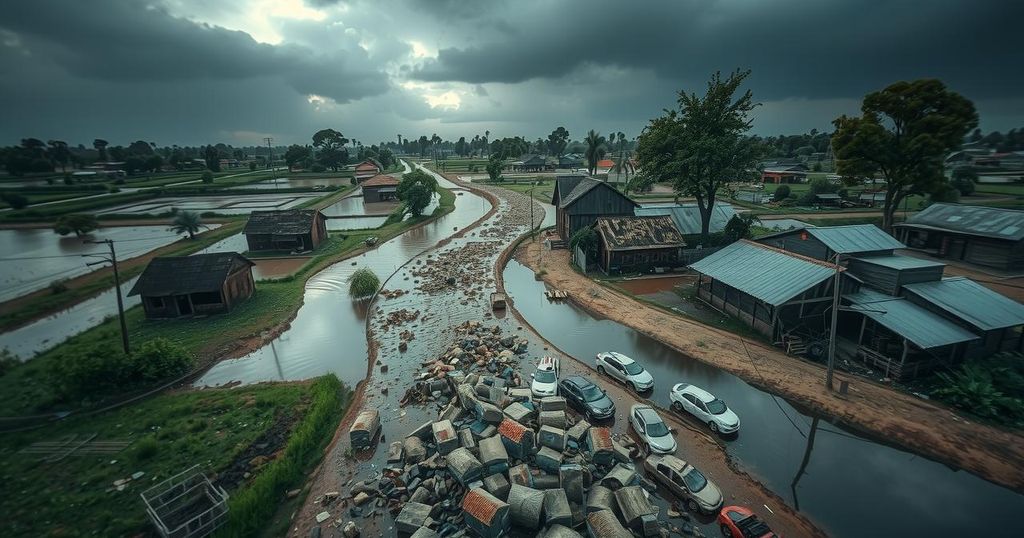Climate change
ADANKOLO, AFP, AFRICA, BENUE, CENTRAL AFRICA, CLIMATE CHANGE, DISASTER MANAGEMENT, FATIMA BILYAMINU, FLOODING, FOOD SECURITY, IDRIS EGBUNU, JOHN OKUNYOMIH, KOGI, LOKOJA, NIGER, NIGER RIVER, NIGERIA, OCHA, SANDRA MUSA, UNITED NATIONS OFFICE FOR THE COORDINATION OF HUMANITARIAN AFFAIRS, WEST
Fatima Khan
0 Comments
The Dire Impact of Climate Change on Flooding in Africa
Severe flooding exacerbated by climate change has consistently affected central Nigeria, notably impacting residents like Idris Egbunu and Fatima Bilyaminu. As of 2024, approximately 6.9 million people engaged across West and Central Africa have been affected, with significant agricultural and infrastructural damage. Experts warn that without substantial reductions in greenhouse gas emissions, the cycle of devastating flooding will likely intensify, threatening lives and livelihoods on the continent.
In recent years, central Nigeria has faced recurrent and devastating flooding, with 67-year-old Idris Egbunu experiencing the turmoil firsthand as rising waters from the Niger River frequently inundate his home. Each rainy season, floods strike, leading to extensive damage and necessitating repairs to his residence every year. The situation is symptomatic of a wider crisis across Africa, where climate change has disrupted weather patterns, exacerbating flooding occurrences, particularly this year. The latest reports indicate that approximately 6.9 million people across West and Central Africa have been affected by severe flooding in 2024, as determined by the United Nations Office for the Coordination of Humanitarian Affairs (OCHA). The harrowing trend began in earnest in 2012 and has since worsened, with 2022 witnessing Nigeria’s most catastrophic floods in a decade, resulting in over 500 fatalities and further displacing 1.4 million individuals. While recent floods have not reached the catastrophic levels of the past, emergency officials, such as Sandra Musa from the Kogi State government, acknowledge that the situation remains dire, with approximately two million residents impacted in Kogi state alone. Individual accounts, such as that of Fatima Bilyaminu, illustrate the profound personal losses endured. Unable to access her home without a boat, she has lost nearly all her possessions due to rising waters. These recurring flood events threaten not only residential structures but also agricultural stability, jeopardizing regional food security and livelihoods. Africa, despite contributing roughly four percent of global greenhouse gas emissions, is disproportionately affected by climate change, which has facilitated extreme weather patterns leading to floods and severe rainfall. Aida Diongue-Niang of the UN’s Intergovernmental Panel on Climate Change (IPCC) noted that the unusual volume and intensity of rainfall are indicative of climate change’s impacts. In neighboring regions, reports from Mali, Niger, Chad, and Cameroon demonstrate the widespread devastation from flooding—with thousands displaced and infrastructure severely damaged. The IPCC’s findings suggest that without a significant reduction in greenhouse gas emissions, the frequency and severity of such weather events will only intensify, threatening the lives of millions.
The article addresses the severe impact of climate change on flooding in Africa, specifically focusing on the experiences of residents in central Nigeria. As the region faces increasingly intense and frequent flooding, the consequences have rippled across various sectors including housing and agriculture. By highlighting the personal narratives of those affected, it underscores the urgency of addressing climate adaptation and mitigation strategies in a continent that suffers disproportionately from the effects of climate change despite its minimal global emissions contribution. Reports from the United Nations and meteorological agencies provide data necessary to understand the scale of the crisis and its implications for millions of people living in vulnerable conditions across Africa.
The rising frequency and severity of floods in Africa, particularly in Nigeria, highlight the urgent need for comprehensive climate action. As residents like Idris Egbunu and Fatima Bilyaminu endure devastating impacts, it is evident that addressing the root causes of climate change through reduced greenhouse gas emissions is critical. International cooperation and strong policy frameworks will be essential to mitigate future risks and support affected communities, ensuring that they can withstand the increasingly severe impacts of climate change.
Original Source: www.barrons.com




Post Comment